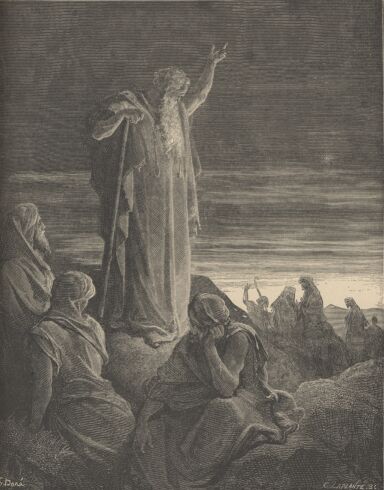EZEKIEL PROPHESYING.

|

|
Ezekiel, the third of the great Hebrew prophets, was the sonof the priest Buzi. (Ezekiel i, 3). He was probably born about620 or 630 years before Christ, and was consequently acontemporary of Jeremiah and Daniel, to the latter of whom healludes in chapters xiv, 14-20 and xxviii, 3. When Jerusalem wastaken by Nebuchadnezzar in 597 B.C. (2 Kings xxiv, 8-16; Jeremiahxxix, 1-2; Ezekiel xvii, 12; xix, 9), Ezekiel was carried captivealong with Jehoiachin, or Jeconiah, king of Judah, and thousandsof other Jewish prisoners, to Babylonia, or as he himself callsit, "the land of the Chaldeans." (Ezekiel i, 3). Here, along withhis exiled fellow-countrymen, he lived on the banks of the riverChebar (Ezekiel i, 1-3), in a house of his own (viii, i). Herealso he married, and here, too, his wife, "the desire of hiseyes," was taken from him "with a stroke" (Ezekiel xxiv, 15-18).His prophetic career extended over twenty-two years, from about592 B.C. to about 570 B.C.
The book bearing his name is written in a mystical andsymbolical style, and abounds with visions and difficultallegories which indicate on the part of the author thepossession of a vivid and sublime imagination. Ezekiel'sauthorship of it has been questioned. The Talmud attributes it tothe Great Synagogue, of which Ezekiel was not a member. It isdivisible into two portions. The first (chapters i-xxiv) waswritten before, and the second (chapters xxv-xlviii) after, thedestruction of Jerusalem by Nebuchadnezzar in 586 B.C, theeleventh year of the prophet's captivity (Ezekiel xxvi, 1-2; XI,i). The present text is very imperfect, being corrupted by theinterpolation of glosses and other additions by later hands.
Dore's picture represents the prophet uttering his oracles tohis fellow-exiles ("them of the captivity"), or to the "elders ofJudah," or "elders of Israel," on one of the occasions to whichhe himself alludes (viii, I; xi, 25; xiv, I; xx, I).